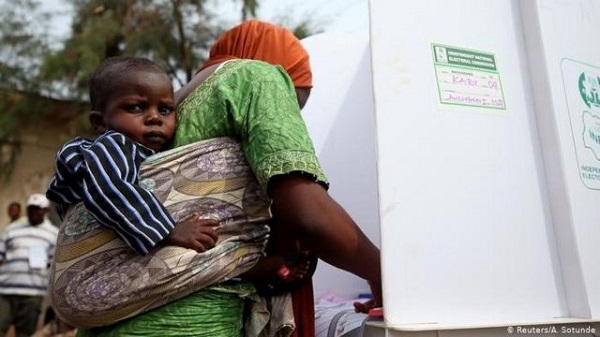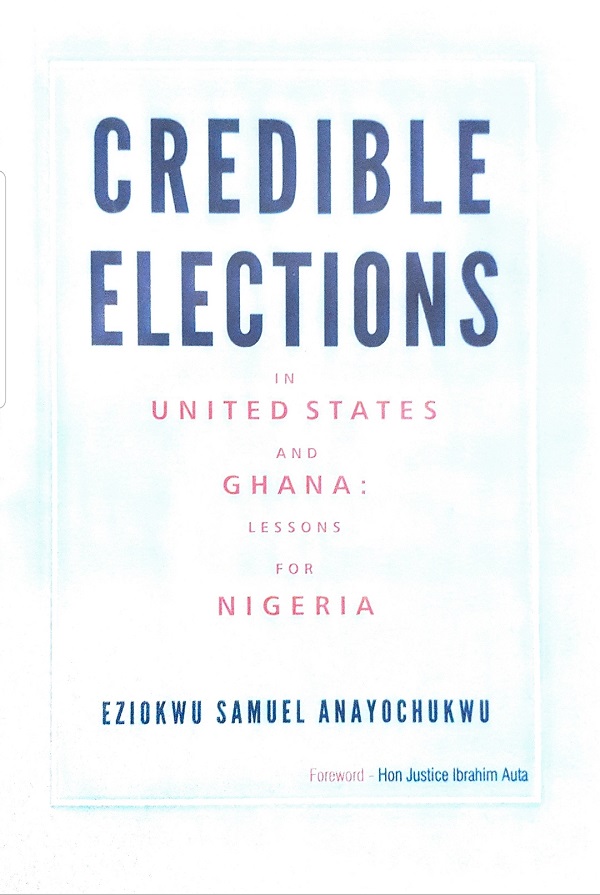
The book “Credible Elections In United States and Ghana: Lessons For Nigeria” written by the executive director, Human Rights Awareness Initiative (HURAI), Dr. Samuel Eziokwu is set for launch on August 4, 2022, in Abuja.
A statement personally signed by the author and made available to journalists said the book with a foreword by the Hon. Justice Ibrahim Auta, the Hon. Chief Judge of the Federal High Court of Nigeria (Rtd.) and foreword comment by former senior minority leader, Sen. Enyinnaya Abaribe, delves into the USA and Ghana elections to highlight takeaways for the country as she prepares for polls in 2023.
He said that the book exposed credible election as the process of voting by the people to convey their will as the only authority to govern that confers legitimacy on elected leaders.
Eziokwu said the work scientifically analyses the electoral processes in both countries and proffers lessons for Nigeria for credible electoral reforms.
“[The] study relied on input-output theoretical framework whose protagonist is David Easton, a foremost political scientist whose theory is used as a veritable tool for analysing political system.
“The propositions in the study are first, a nexus between the credible election and credible electoral laws, election management body, personnel, procedures and practices.
“Secondly, credible elections confer legitimacy on elected candidates and governments. Third, credible elections promote peace, stability and national development.
“[A] study of the three countries substantiates and validates the propositions by positive appraisal and affirmations. This is why elected leaders are eulogised and revered in the United States while in Ghana only voters’ turnout during elections attests and demonstrates their trust in the electoral process.
“In Nigeria, abysmal voters’ turn out in elections and lack of political will towards credible electoral reforms of electoral laws and operations that do not measure up to international best practices, speak volumes of electoral malfeasances in Nigeria.”

According to him, the book conceptually defines principles of credible election, vis: Inclusiveness that ensures that election must provide equal opportunity for all participants as voters and candidates; Transparency of election to guarantee that each step is open to scrutiny and stakeholders can interrogate the process.
“Accountability of elections which warrants that every process must be held accountable. There must be remedies in place and executed for violation of electoral laws, especially election-related rights.
“Competitive election guarantees reasonable and equitable opportunities to compete to be elected into a government office to be reflected in the electoral cycle devoid of violence, intimidation,” he explained.
He said that the book outlined other conceptual underpinning principles for credible elections like the international law concept of credible election which sees periodic and genuine elections as rights of citizens.
Amongst others, he said passing the electoral test for selection which every candidate must go through based on specified values of competence, character, and capacity.
Eziokwu added that free expression of the people delivered in the sanctity of votes; sustaining credible election institutions that would not abuse the electoral process.
“The book infers that when the election is woefully flawed what remains is totalitarianism, prebendalism and authoritarianism; not democracy which is the government of the people by the people.
“This gives rise to absolute power which corrupts absolutely and destroys the sovereign power of the people.
Justice Auta described the book in his foreword as “…a challenge to nascent democracies to make and execute laws regulating elections, intentionally appoint credible election management bodies [that are] truly independent, give close attention to credible voters’ registration, voting, vote counting, transmission and collation of results…”.
Abaribe insisted that “…since politics is the arena within which our fate as a nation will be decided, the book is a must-read for both practitioners and citizens who, as a duty, must engage in politics. It explores a wide range of issues in elections and compares our processes with that of other climes within our sub-region and others outside our hemisphere,” he said.

